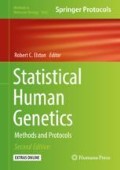Abstract
Haplotypes, as they specify linkage patterns between individual nucleotide variants, confer critical information for understanding the genetics of human diseases. However, haplotype information is not directly obtainable from high-throughput genotyping platforms. In this chapter, we introduce four representative methods to reconstruct haplotypes from unphased genotype data, two of them are for unrelated individuals and the other two are for families.
References
Bonizzoni P, Della Vedova G, Dondi R, Li J (2003) The haplotyping problem: an overview of computational models and solutions. J Comput Sci Technol 18:675–688
Gusfield D (2004) An overview of combinatorial methods for haplotype inference. In: Computational methods for SNPs and haplotype inference, pp 599–600
Halldorsson B, Bafna V, Edwards N, Lippert R, Yooseph S, Istrail S (2004) A survey of computational methods for determining haplotypes. In: Computational methods for SNPs and haplotype inference, pp 613–614
Zhang X, Wang R, Wu L, Chen L (2006) Models and algorithms for haplotyping problem. Curr Bioinforma 1:105–114
Li J, Jiang T (2008) A survey on haplotyping algorithms for tightly linked markers. J Bioinforma Comput Biol 6:241–259
Browning SR, Brownig BL (2011) Haplotype phasing: existing methods and new developments. Nat Rev Genet 12:703–714
Scheet P, Stephens M (2006) A fast and flexible statistical model for large-scale population genotype data: applications to inferring missing genotypes and haplotypic phase. Am J Hum Genet 78:629–644
Li Y, Willer CJ, Ding J, Scheet P, Abecasis GR (2010) MaCH: using sequence and genotype data to estimate haplotypes and unobserved genotypes. Genet Epidemiol 34:816–834
Li Y, Willer CJ, Sanna S, Abecasis GR (2009) Genotype imputation. Annu Rev Genomics Hum Genet 10:387–406
Li X, Li J (2009) An almost linear time algorithm for a general haplotype solution on tree pedigrees with no recombination and its extensions. J Bioinforma Comput Biol 7:521–545
Li X, Li J (2011) Haplotype reconstruction in large pedigrees with untyped individuals through IBD inference. J Comput Biol 8(11):1411–1421
Abecasis G, Cherny S, Cookson W, Cardon L (2001) Merlin – rapid analysis of dense genetic maps using sparse gene flow trees. Nat Genet 30:97–101
Stephens M, Smith N, Donnelly P (2001) A new statistical method for haplotype reconstruction from population data. Am J Hum Genet 68:978–989
The International HapMap Consortium (2003) The international HapMap project. Nature 426:789–796
Excoffier L, Slatkin M (1995) Maximum-likelihood estimation of molecular haplotype frequencies in a diploid population. Mol Biol Evol 12:921–927
Hawley M, Kidd K (1995) HAPLO: a program using the EM algorithm to estimate the frequencies of multi-site haplotypes. J Hered 86:409–411
Niu T, Qin Z, Xu X, Liu J (2002) Bayesian haplotype inference for multiple linked single-nucleotide polymorphisms. Am J Hum Genet 70:157–169
Qin Z, Niu T, Liu J (2002) Partition-ligation-expectation-maximization algorithm for haplotype inference with single-nucleotide polymorphisms. Am J Hum Genet 71:1242–1247
Sun S, Greenwood C, Neal R (2007) Haplotype inference using a Bayesian hidden Markov model. Genet Epidemiol 31:937–948
Browning S, Browning B (2007) Rapid and accurate haplotype phasing and missing-data inference for whole-genome association studies by use of localized haplotype clustering. Am J Hum Genet 81:1084–1097
Howie BN, Donnelly P, Marchini J (2009) A flexible and accurate genotype imputation method for the next generation of genome-wide association studies. PLoS Genet 5(6):e1000529
O’Connell J (2000) Zero-recombinant haplotyping: applications to fine mapping using SNPs. Genet Epidemiol 19:S64–S70
Qian D, Beckmann L (2002) Minimum-recombinant haplotyping inpedigrees. Am J Hum Genet 70:1434–1445
Tapadar P, Ghosh S, Majumder P (2000) Haplotyping in pedigreesvia a genetic algorithm. Hum Hered 50:43–56
Zhang K, Sun F, Zhao H (2005) HAPLORE: a program for haplotype reconstruction in general pedigrees without recombination. Bioinformatics 21:90–103
Chan M, Chan W, Chin F, Fung S, Kao M (2006) Linear-timehaplotype inference on pedigrees without recombinations. In: Algorithms in bioinformatics, pp 56–67
Xiao J, Liu L, Xia L, Jiang T (2007) Fast elimination of redundant linear equations and reconstruction of recombination-free Mendelian inheritance on a pedigree. In: Proceedings of the eighteenth annual ACM-SIAM symposium on discrete algorithms, pp 655–664
Li X, Chen Y, Li J (2010) Detecting genome-wide haplotype polymorphism by combined use of Mendelian constraints and local population structure. Pac Symp Biocomput 15:348–358
Liu L, Xi C, Xiao J, Jiang T (2007) Complexity and approximation of the minimum recombinant haplotype configuration problem. Theor Comput Sci 378:316–330
Elston R, Stewart J (1971) A general model for the genetic analysis of pedigree data. Hum Hered 21:523–542
Lander E, Green P (1987) Construction of multilocus genetic linkage maps in humans. Proc Natl Acad Sci U S A 84:2363–2367
Sobel E, Lange K (1996) Descent graphs in pedigree analysis: applications to haplotyping, location scores, and marker-sharing statistics. Am J Hum Genet 58:1323–1327
Kruglyak L, Daly M, Reeve-Daly M, Lander E (1996) Parametric and nonparametric linkage analysis: a unified multipoint approach. Am J Hum Genet 58:1347–1363
Gudbjartsson D, Jonasson K, Frigge M, Kong A (2000) Allegro, a new computer program for multipoint linkage analysis. Nat Genet 25:12–13
Abecasis G, Wigginton J (2005) Handling marker-marker linkage disequilibrium: pedigree analysis with clustered markers. Am J Hum Genet 77:754–767
Li J, Jiang T (2003) Efficient inference of haplotypes from genotypes on a pedigree. Int J Bioinforma Comput Biol 1:41–70
Doi K, Li J, Jiang T (2003) Minimum recombinant haplotype configuration on tree pedigrees. In: Algorithms in bioinformatics, pp 339–353
Li J, Jiang T (2005) Computing the minimum recombinant haplotype configuration from incomplete genotype data on a pedigree by integer linear programming. J Comput Biol 12:719–739
Li X, Li J (2007) Comparison of haplotyping methods using families and unrelated individuals on simulated rheumatoid arthritis data. BMC Proc 1:S55
Acknowledgments
This work was supported in part by NIH R03 HG008632.
Author information
Authors and Affiliations
Corresponding author
Editor information
Editors and Affiliations
Rights and permissions
Copyright information
© 2017 Springer Science+Business Media LLC
About this protocol
Cite this protocol
Song, S., Li, X., Li, J. (2017). Haplotype Inference. In: Elston, R. (eds) Statistical Human Genetics. Methods in Molecular Biology, vol 1666. Humana Press, New York, NY. https://doi.org/10.1007/978-1-4939-7274-6_23
Download citation
DOI: https://doi.org/10.1007/978-1-4939-7274-6_23
Published:
Publisher Name: Humana Press, New York, NY
Print ISBN: 978-1-4939-7273-9
Online ISBN: 978-1-4939-7274-6
eBook Packages: Springer Protocols

